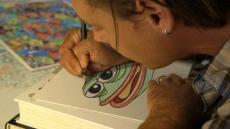「インターネットは日常生活に溢れ出しているから、それが自分たちに与える影響について、僕らはもっと真剣に考える必要がある」『フィールズ・グッド・マン』 アーサー・ジョーンズ監督&ジョルジオ・アンジェリーニ インタビュー/Interview with Arthur Jones and Giorgio Angelini about “Feels Good Man”
NeoL / 2021年3月11日 20時30分
「インターネットは日常生活に溢れ出しているから、それが自分たちに与える影響について、僕らはもっと真剣に考える必要がある」『フィールズ・グッド・マン』 アーサー・ジョーンズ監督&ジョルジオ・アンジェリーニ インタビュー/Interview with Arthur Jones and Giorgio Angelini about “Feels Good Man”
楽しんで描いていたはずのハッピーなキャラクターが、作者の知らない場所で別人格を与えられ、ヘイトの象徴としてネット上に拡散するー。3月12日に全国公開される『フィールズ・グッド・マン』は、そんな恐ろしい現象を経験したアメリカ人アーティストのマット・フューリーが、イメージ奪還のために奮闘する姿に密着したドキュメンタリー映画だ。なんとものんきな表情が印象的なカエルのペペは、フューリーが自身を投影して生み出した陽気なキャラクターで、アンダーグラウンド・コミック界でカルト的人気を誇っていた。しかし、ペペが放ったセリフ「Feels good, man(気持ちいいぜ)」がきっかけとなり、ネットミーム(ネットを通じて模倣され、広がっていくイメージやコンセプト)として知られるように。そして2016年のアメリカ大統領選を前に、オルタナ右翼が人種差別的な人格を植え付けたペペを匿名掲示板「4chan」で拡散。ついにはADL(名誉毀損防止同盟)からヘイトシンボルとして正式認定されてしまう…。映画はマットの私的な経験を主軸に、各界の識者による見解も交え、インターネットが社会に及ぼす影響力や危険性を紐解く。日本公開を前に、アーサー・ジョーンズ監督とプロデューサーのジョルジオ・アンジェリーニ氏がロサンゼルスからリモートインタビューに応じ、映画の制作秘話を語ってくれた。(→ in English)
―『フィールズ・グッド・マン』は監督デビュー作だそうですが、それまではどのような活動をされていたのですか?
アーサー・ジョーンズ監督「僕たちにとってドキュメンタリー制作は2つ目か3つ目のキャリアなんだ。僕は大学で絵画を専攻して、絵画やグラフィックデザインやアニメーションを手がけていた。それから友人たちのドキュメンタリー制作を手伝うようになって、ジョルジオは建築家なんだけど、彼が住宅政策に関するドキュメンタリーを制作したときにも手伝ったんだ。それがとても良い経験だったから、僕らは一緒に『フィールズ・グッド・マン』を手がけることになった。それに僕はマンガが大好きで、小さい頃から夢中だった。だから『フィールズ・グッド・マン』は、マンガの重要性を伝えるための映画を制作するチャンスでもあったんだ。マンガは使い捨ての文化ではない。それは僕らのコミュニケーションの大きな部分を占めている。僕はこの機会を得て、そういった意味でも興奮していた」
ジョルジオ・アンジェリーニ(プロデューサー)「僕は人生の大半をミュージシャンとして活動してきた。だけど(後にリーマン・ショックに発展した)住宅バブルの崩壊のせいで音楽業界も崩壊してしまい、新しいキャリアを見つける必要に迫られて建築を勉強したんだ。でも映画を作りたいと思っていた僕は、人種差別と住居の歴史に関するドキュメンタリーを制作するチャンスを得て、その作品を通してアーサーに出会った。そしてその映画の制作が終わる頃、アーサーが本作の企画について教えてくれた。僕はRedditをよく使うからペペのことは昔から知っていたし、ミームとしてのペペの変異に不快感を抱いていたんだ。でもマット(・フューリー、ペペの生みの親)の存在は知らなかったから、個人的に彼と仲が良いアーサーから裏話を聞いたときは少し怖くなったし、(不快感を抱いたことを)恥ずかしく思った。とにかく、そんな感じで話が進んだんだ」
―マットの方から助けてほしいと言われたのですか? それとも、監督が映画を制作することで彼を助けようと思いついたのですか?
アーサー・ジョーンズ監督「僕はマットと友だちだったから、パーティなどで会うたびにペペについて聞いていて、それが彼に被害を与え始めていることに気づいたんだ。マットはペペを使って何かポジティヴなことをしたがっていて、ペペに起きたことを説明するためのマンガを作ろうという話になった。それでロサンゼルスのエンタメ業界の何人かに相談したんだけど、ペペの負の遺産があまりにもひどかったので、誰も僕らと話したがらなかった。中には生みの親だというだけで、マットがネオナチだと思っていた人もいたぐらいで」
―そうだったんですね。
アーサー・ジョーンズ監督「そのようなことを経て、僕はドキュメンタリーが一番良い手段だと気づいた。ジョルジオの作品などに携わってきたこともあって、ドキュメンタリーに夢中だったしね。マットには率直に、『僕にドキュメンタリーを作らせるべきだと思う』と伝えたよ。僕らはペペの物語がドキュメンタリーのネタとして十分ユニークであること、そして、それは友人たちの手で描かれるべきだということに気づいた。本作はそうやってスタートしたんだ」


ー劇中では赤ちゃんだったマットの娘の成長とともに時間の経過を感じました。制作にはどれくらいの時間がかかったのですか?
ジョルジオ・アンジェリーニ「実はドキュメンタリーとしては、かなり急いで制作したんだ。その理由の一つは、昨年の大統領選挙の前に公開したかったから。実際の制作期間は2年くらいなんだけど、それってアースラ(マットの娘)にとっては人生の半分だからね(笑)」
アーサー・ジョーンズ監督「マットの娘のアースラは、ちょうどペペがひどいことに巻き込まれた2015年に生まれたんだ。昨年はいろんな取材で、マットはナイーブだとか、なぜもっと早く対処しなかったんだとか言われたよ。でも現実には、彼はアーティストとして家族を養うことで精一杯な若い父親だったわけで。2015年のマットにとっては、オルタナ右翼と戦うことよりも、オムツ替えの方が心配だったたんだ」
―観客に情報を提示するだけのドキュメンタリーとは違って、本作ではマットが主軸に描かれているので、より感情移入しやすかったように思います。劇中のペペとマットが深みにはまっていくのを一緒に体験できたように感じましたが、あえてこのような構成にしたのですか?
ジョルジオ・アンジェリーニ「そのことについては当初から話していたんだけど、アーサーも僕も最初からドキュメンタリー監督だったわけではないからだと思う。異なる芸術分野から来た僕らは、ジャーナリズム優先で映画であることは二の次とされているドキュメンタリーが多いように思っていたんだ。情報を詰め込んで、観客を教育して終わり、という感じでね。でも僕らはジャーナリズムである前に、映画を作りたいと思っていた。決してジャーナリズムをないがしろにするわけではないけれど、まず何よりも映画を作るという認識でありたかった」
―それは伝わってきました。
ジョルジオ・アンジェリーニ「観客がマットと一緒に学んでいくという意味では、他にも良いことがあった。僕らは映画の前半で(ミームに関する)近年の歴史を説明しているんだけど、訴訟の真っ最中のマットに密着できたのはラッキーだったよ。物語をリアルタイムで伝えることができたから、とてもダイナミックなタイムラインを作り出すことができた」
アーサー・ジョーンズ監督「マットの法廷闘争は、彼の私的な旅の一部でもあったんだ。それは受動的だった人が積極的になるまでの物語で、僕らはそれを通して観客にとてもパワフルなメッセージを送ることができると考えた。人生で問題を抱えている人にとって、その問題を対処する上でのシンプルな真実がそこにある。問題に対処するマットの姿は逞しかった」


―劇中では実際の供述録取の映像も使用されています。
アーサー・ジョーンズ監督「マットの供述録取は彼にとってパワフルなシーンだと思う。居心地の悪い場面においても、彼のエネルギーや楽観主義なところや優しさがはっきりと表れているから。本作はユースカルチャーのオーディエンスに向けて作ったんだ。多くのドキュメンタリーの観客は、もう少し上の世代だと思う。でも、もし自分が若い頃に居心地の悪い状況に置かれたマットの姿を観ていたら、刺激をもらえたと思うんだ。彼はアーティストとして妥協することなく人生を生きていて、立ち上がり、正しいことをしていながらも、自分らしくあることを忘れていないわけだからね。僕はあのシーンのマットをとても誇りに思っている。観客も同じように感じてくれたらうれしいよ」
―劇中に登場する4ちゃんねらーのピッツァとミルズには、どのように出演交渉したのですか?
アーサー・ジョーンズ監督「ミルズもピッツァも4chan上で顔を出していたんだ。ミルズはネット上にいくつか動画をアップしていた。その中に、ベッドに寝転がった彼が『ペペは俺にとって何を意味するのだろう?』と自問する動画があって、僕はそれをとても親密で印象的だと感じたんだ。初めて観たときは、カメラを見つめるミルズが自分のことを見つめているような気分になって、きっと映画に出てくれるはずだと思った。連絡先を探すのにはちょっとしたネット上の調査が必要だったけど、この映画の全てがネット上の調査からできているからね(笑)。本作を完成させるためには、ディープでダークなネット調査をたくさん要したわけで、ミルズの連絡先もその一つだった」
ジョルジオ・アンジェリーニ「それに関して言うと、現在のインターネットの本質として、ミルズのような4chanを使っている人たちでさえ、ネット上の人格でキャリアを築こうとしているんだよね。だからある意味、彼は4chanで自分自身を利用して、自分を笑いのネタにしたり、恥ずかしい目に遭ったりすることで人気を得ようとしている。それは今、特にアメリカで多くの人が送っている、とても歪んだ奇妙な人生なんだ。彼らは生活のあらゆる側面を収益化しなければならないと感じている。全てをネット上にアップして、ライブ配信して、ミームにして、TikTokに投稿して、あわよくばそれがバイラルとなってキャリアを築ければいいなと願っているんだ。とても奇妙な世界だよ」
―劇中では学者や心理学者やジャーナリストも登場して、さらなる解説をしています。オカルト信仰者まで登場して驚きました。
ジョルジオ・アンジェリーニ「あのオカルト信仰者は、僕がペペに関するプロジェクトを手がけることを偶然耳にした人から紹介されたんだ。『ペペのプロジェクトを手がけるのなら、ジョン・マイケル・グリアをチェックするべきです』とメールしてくれた。それでアーサーと一緒に彼の名前をググったら、長いヒゲを生やしてローブを着た人が出てきた。彼はアーチドルイドといって、古代の異教徒だかスカンジナビアだかイギリスだかを崇拝しているとかなんとか…僕にもそれが何だかよくわかっていないんだけど(笑)。イギリスのストーンヘンジと関係があるらしい」
―(笑)
ジョルジオ・アンジェリーニ「でも彼の本を読んでみたら、僕らの映画の主軸にある説明するのがとても難しいことについて、非常に知的に書かれていた。ミームの持つ社会的な力やミーム・マジックについてね。僕らはずっとミーム・マジックについて触れたいと思っていた。それは本作で取り上げた他の全てのことと同様に、馬鹿げているけれど、とてもシリアスでもあるトピックなんだ。それにフィルムメーカーとして、『君はこの男を信じる? それとも冗談だと思う?』と観客を試す意味もあった。彼のシーンは間違いなく楽しい思い出の一つだよ(笑)」
ーペペをモチーフにした仮想通貨について語る男性も出演しています。
ジョルジオ・アンジェリーニ「僕らはペペにまつわる現象がどこまで広がっているかを描きたくて、中でもペペ・キャッシュが最も馬鹿げた一例だと思ったんだ。他にもロシアに住んでいる女性で、有名な絵画の巨大なレプリカにペペを描いている人にも取材したよ(笑)。世界中でクレイジーなことがたくさん起きていた」


―映画の終盤では、アメリカでヘイトシンボルに認定されたペペが、香港の民主化運動における希望のシンボルになる様子が描かれています。なぜ香港では、あのような現象が起きたのだと思いますか?
アーサー・ジョーンズ監督「ペペは世界中の様々な場所で、異なる意味合いを持っているんだ。アメリカでは人種差別主義者のシンボルとして使われてしまったけど、韓国や台湾や香港や中国では人気があった。“悲しみカエル(sad frog)”は、基本的にはインターネット上における不幸な人のシンボルなんだよね。香港での出来事は、とあるデモの参加者が、中国の警察に非致死性兵器で顔を撃たれたことがきっかけだった。彼女は次のデモに眼帯をして、ヘルメットをかぶって、手作りのプラカードを持って参加したんだけど、そこにはペペになった彼女の姿が描かれていたんだ。ペペも眼帯をしていたんだよ。そのイメージが欧米のメディアに取り上げられたことで、彼らは『人々は注目している。彼らにとって、これは報道価値のあるものなんだ』と気づくことになった。それにより、ぺぺは『私たちを助けて』を意味するシンボルになったんだ」
―なるほど。
アーサー・ジョーンズ監督「それに、ペペは匿名性のシンボルであることも言っておきたい。中国当局がデモの参加者を追跡するために顔認識ソフトを使用しているので、参加者はマスクをしているからね。だから、ペペは再び全ての人のための顔となったんだ。また、これは世界中の政治や組織にとって、ミームがいかに重要かも物語っている。アメリカだけではなくて、世界中でミームが重要視されているんだ。ここでもまた、ミームは意外なところで使用され、すごい速さで、予想外の形で文化に影響を与えている」
―制作陣も香港での現象には驚いたのではないでしょうか。撮影の終盤の出来事だったのですか?
ジョルジオ・アンジェリーニ「僕らの誰もが衝撃を受けたし、驚いたし、大喜びだったし、ハッピーだったよ。本当に感動的な体験だった。サンダンス映画祭に提出する3週間前の出来事だったんだ。ラッキーなことに、本作で取材したアーロン・サンキンというジャーナリストが、その2週間前に香港に引っ越したばかりだった。そこで彼と香港在住のダイアナ・チャンという報道写真家をつなげて、僕らの代わりに取材してもらうことにした。アーサーがどんな素材を撮ってほしいか書いたリストを送ったんだ。翌朝目が覚めたら、Google Driveいっぱいの映像が届いていた。あまりに美しくて泣いてしまったよ」


―劇中でマットの友人が、『こんなことはお前にしか起きない』と言いますよね。でも映画を観ているうちに、これは誰にでも起こり得ることだなと思いました。本作を観て色々考えさせられたのですが、お二人が本作から得た一番大きなことは何ですか?
ジョルジオ・アンジェリーニ「日本人の視点がどうなのか興味深いけど、少なくとも欧米における現在のインターネットの在り方は、僕らをより闘争的で、怒りっぽく、皮肉っぽくする傾向にある。僕たちはこの映画を作ることで、誰にでも選択肢があるということ、ネット上でイケていないとされているからといって、思いやりや愛情を持ったり、共感したりするのは恥ずかしいことではないということを、人々に思い出させたかったんだと思う。こういったことは、今となっては実生活にまで影響を与えている。インターネットは日常生活に溢れ出しているから、それが自分たちに与える影響について、僕らはもっと真剣に考える必要があるんだ」
アーサー・ジョーンズ監督「僕もジョルジオの言ったことに賛成するよ。僕が本作から得たのは非常に私的なもので、それは一緒に制作した仲間たちへの愛情なんだ。それもまた、ジョルジオの見解と近い思う。この映画の制作は驚きに満ちていた。マットに驚かされたり、いろんな出来事に驚かされたりしたことが何度もあった。そういったサプライズのうちの一つが、才能があり、賢くて、献身的な人たちと一緒に芸術作品を作ると、必ず彼らの素晴らしさに圧倒され、驚かされるということだった。今この瞬間だって、日本にいる君と話しているなんて、この映画はなんてワイルドな経験になったんだろうって思うよ。サプライズを受け入れて、創造性に打ち込むこということは、シンプルな真実に過ぎないのかもしれない。でも、それこそが『フィールズ・グッド・マン』について考えたときに僕の頭に浮かぶことなんだ」
text Nao Machida
『フィールズ・グッド・マン』
2021年3月12日(金)よりユーロスペース、新宿シネマカリテにて公開。ほか全国順次
公式HP:https://feelsgoodmanfilm.jp
STORY
マット・フューリーの漫画 Boy’s Club」は、チルでハッピーなキャラクターたちが繰り広げる若者のリアルな日常を描き、カルト的な人気を博した。しかしその主人公ぺぺが放ったセリフ「 feels good man(気持ちいいぜ)」が全ての始まりとなる。いつからか掲示板や SNSには、このセリフと共に“ネットミーム”として改変されたぺぺが溢れだした。2016年アメリカ大統領選時には、匿名掲示板「 4chan」でオルタナ右翼たちが人種差別的なイメージとともにぺぺを大拡散。挙句に ADL(名誉毀損防止同盟 )からヘイトシンボルとして正式認定される始末…。マットの思いとは裏腹にぺぺの乱用は更に加速し、なんとトランプ大統領の誕生に一役買うまでになり…。
出演:マット・フューリー、ジョン・マイケル・グリア、リサ・ハナウォルト、スーザン・ブラック モア、サマンサ・ビー、アレックス・ジョーンズ、カエルのぺぺ 監督・脚本:アーサー・ジョーンズ
撮影・脚本:ジョルジオ・アンジェリーニ 編集・脚本:アーロン・ウィッケンデン
原題:Feels Good Man 2020 年/アメリカ/94 分 配給:東風+ノーム
(C)2020 Feels Good Man Film LLC
公式FBページ:https://www.facebook.com/FeelsGoodManFilmjp/
公式ツイッター:https://twitter.com/FeelsGoodManjp
公式インスタグラム:https://www.instagram.com/feelsgoodmanfilmjp/

―I have read that "Feels Good Man" is your feature debut as a director. What did you guys do before this movie?
Arthur Jones: We both come to documentary as our second or maybe third career. I went to college as a painting major. I've always been involved in the arts, but painting, graphic design, animation. And then, I was helping friends make documentaries as a motion graphic artist and re-toucher. And Giorgio was making a documentary film about housing policy - he's an architect by trade - and so we worked on that together. I did the animation in his film, and we started working on "Feels Good Man" together because that was such a good experience. But I love cartoons, they've always been my passion since I was a little kid. So "Feels Good Man" was an opportunity to really make a film about why cartoons are important. They are not disposable culture. They are a big part of the way we communicate. So that was something I was excited about.
Giorgio Angelini: I was playing music for most of my life, and I studied architecture really because of the housing crisis killed the music world, and I needed to find a new career. But I wanted to do film and I found the opportunity to make my first documentary about the history of racism and housing in America, and that's how I met Arthur. And when we were finishing that, Arthur told me about his plans to make this film. I had known about Pepe for a long time because I spend a lot of time on Reddit. I knew Pepe as a meme and I was disturbed by its transformation. But I didn't know Matt(Furie, the creator of Pepe) existent. Arthur had a personal relationship with Matt, so I was kind of horrified and embarrassed when Arthur was telling me Pepe's back story. Anyway, so that's sort of how it all came to be.
―So Did Matt ask for your help? Or did you want to help him by making this film?
AJ: I was friends with Matt and whenever I would see him at a party or something, I would often ask him about Pepe, and I could see that this story was beginning to take a little bit of a tall on him. And then we started talking about collaborating because I think Matt wanted to do something with Pepe that was positive. His first idea was working with me to help him make a cartoon that would explain what happened to Pepe. We talked to a few people in Los Angeles in entertainment industry about that. And you could realize that the negative baggage of Pepe was so bad that just no one wanted to talk to us. Some of them even thought that Matt was a neo-Nazi because he's drawn the character.
―Oh no…
AJ: So after that experience, it occurred to me that a documentary was the best way to do it. And I just so happen to have been working on Giorgio's film and a couple of other films with friends, and I think from working on those, I had the documentary bug. So I just asked Matt very straight forwardly, "I think you should let me make a documentary about it." And he and I realized that the story with Pepe was unique enough that it should be captured and it should be captured by friends. So that's the way it started.


―You can tell how much time has passed by watching Matt’s baby girl turning into a toddler. How long was the whole process?
GA: It was actually very quick for a documentary, partly because we really wanted to make sure that the film came out before the most recent presidential election. But it was about two years which for Ursula (Matt’s daughter) is half of her life [laughs.]
AJ: When all of the terrible stuff was happening with Pepe in 2015, that's when Ursula was born. In other interviews we've done over the last year, people have maybe said Matt's naive or asked why he didn't do something sooner. The reality is Matt was a young father trying to provide for his family as an artist. So he was more concerned with changing diapers than fighting the alt-right in 2015.
―What was intriguing about this movie is that unlike a lot of documentaries where they just give you information on the topic, there is Matt at the center of it. As Pepe and Matt go deeper into trouble, the audience can also experience it in real time with them. Was it your intention to involve the audience by structuring the film this way?
GA: That was something that Arthur and I spoke about from the very beginning I think partly because we weren't always documentary filmmakers. We came from different artistic backgrounds, and we felt like documentaries are often pieces of journalism first and film second. Like, we'll just give you a bunch of information and educate you about something, and then it'll end. But we wanted to really make it a film first and journalism second. Never compromising the journalism of it, but of course, recognizing first and foremost that we are making a film.
―I could see that.
GA: The other benefit we had in terms of your question about kind of learning along the way, is that the first half of the film, we are sort of telling a recent history. We were lucky because we were able to capture Matt in the middle of this legal fight, so we got to tell the story in real time. So that was a real gift and it really helped us create a very dynamic timeline.
AJ: And Matt's legal fight, that was part of his personal journey. It's a story of someone going from the passive to the proactive, and we thought that was a very powerful message for any audience member. For people who have problems in their lives, it's a simple truth of dealing with that problem. And so we get to see Matt deal with his problems in real life, and we thought that would be powerful.


―You also used the actual footage of the depositions in the movie.
AJ: I think Matt's deposition is a powerful moment for him, because you see that his energy and optimism and sweetness shine through even in an uncomfortable moment. And I think that we made this film for a youth culture audience. Most documentaries are maybe watched by slightly older crowd. But I think if I had seen Matt in this uncomfortable situation as a young person, it'd be inspiring. It means that he's living his life as an artist, he's living it without compromise, he's standing up and doing what's right, but he's still being himself. That was a moment in the film where I feel so proud of Matt. And I hope that the audience feels the same way.
―How did you get the 4channers, Pizza and Mills, on the film? You even filmed at Mills' home. Aren't they supposed to be anonymous?
AJ: Mills, well, Pizza too, their faces are on 4chan. And people seeking attention is kind of looked down upon within 4chan culture. Mills had some videos that I found online, and there is that video of him lying in bed and he's holding his phone up like this, and he says "What does Pepe mean to me?" And that was the video I found so intimate and striking. I remember that the first time I watched it, he's making eye contact with the camera but I felt like he was making eye contact with me. And I just had a feeling he was going to be in the film. It took a little Internet sleuthing to find his contact information, but this whole film was Internet sleuthing [laughs.] It was a lot of deep dark Internet research to get this thing made and that was part of it.
GA: But the other part of that too is that, it's just the nature of the Internet now that even people on 4chan like Mills are trying to build careers as online personalities. And so in some way he's seeking popularity by exploiting himself on 4chan and being the center of jokes and embarrassment. It's a very twisted and strange life that a lot of, especially Americans are going through now where they feel like they have to monetize every aspect of their life and put it online and livestream it, and captured in a meme and put it on TikTok with the hope that you will go viral and be able to build a career out of that. It's a very strange world.
―You also have a scholar, psychologist and journalist providing additional context. And even an occultist!
GA: [Laughs] He was referred to us by someone who had listened to an interview randomly of me and I had just said that I was working on this new project about Pepe. And then this guy emailed us and said, "Oh, if you're doing a project about Pepe, you should check out this guy, John Michael Greer." And so Arthur and I googled him, and the first images you see when you google him is this long huge beard and robe. And he's what's called an archdruid, like people basically worship kind of ancient pagan Scandinavian British… I don't even really understand what druid is [laughs.] It has something to do with Stonehenge in England.
―[Laughs]
GA: But we started reading his work, and he'd written very intelligently about something very central to our film that is very hard to explain which is the social power of the memes or meme magic. And we knew that we always wanted to talk about meme magic, and like everything else in our film, it's both absurd but also very serious. And he seemed to capture that entire quality in one person. So we are super lucky that we got him because I feel like he explained meme magic in a way that a journalist or any other expert really couldn't. And as filmmakers, I think we're also testing the audience to say like, "Are you going to believe this guy or are we joking?" It was one of the more fun moments of making the film for sure [laughs.]
―What about the guy with cryptocurrency?
GA: We wanted to capture how far gone the whole thing with Pepe had gotten, and Pepe cash seemed like the most absurd example. But we also filmed with the woman in Russia who makes giant paintings replicas of famous artworks and she puts Pepe in place of the actual subjects [laughs.] So there was a lot of crazy stuff happening around the world.


―Why do you think Pepe became the symbol for hope in Hong Kong? Did people in Hong Kong know that Pepe is known as a hate symbol in America?
AJ: Pepe has different connotations in different places all over the world. Pepe had been popular in Korea and Taiwan and Hong Kong and China while it was being used as a racist symbol in the United States. The sad frog is basically a symbol for an unhappy person on the Internet. But the Hong Kong thing specifically happened because there was a protester who was shot in the face with a non-lethal round by the Chinese police. And she showed up to the next protest with the bandage on her eye, a hard hat on, and she made a handmade sign and it's a drawing of Pepe but it's her. He had a bandage over his eye. And that image got picked up by the Western media, that ended up being put on Western websites, published in Western newspapers, and they realized, "Oh, people are watching this. They find this to be a newsworthy thing." So Pepe became a symbol for "Help us."
―I see.
AJ: It's also important to note that Pepe is a symbol for anonymity as well, because the Chinese authority is using facial recognition shot software to track protesters so they are wearing masks. So Pepe was a way of standing in for the every man again. And it also speaks to how important memes are to politics and organizing all over the world right now. It's not just in America that memes are important, it's all over the world. So once again, it's the surprising use of memes that affects culture in the way that's like lightning-fast and unexpected.
―It must have been a surprise for you guys. Did it happen at the end of the filming?
GA: We were all shocked and surprised and elated and happy about it. It was a really moving experience. This happened three weeks before we had to submit the film to Sundance. We were lucky because one of the people we interviewed for the film, this journalist named Aaron Sankin, happened to move to Hong Kong just two weeks before. So we connected him with a photojournalist in Hong Kong named Diana Chan and they went and shot this for us. Arthur made some shot list of the kinds of things we want to see. And the next morning we woke up to a google drive filled with all this footage and we literally cried, because it was so beautiful.


―In the film, Matt's friend tells him that this could only happen to him. But as you watch the film, it made me realize that this could happen to anyone at any time. So this film really made me think and made me scared as well. What do you think was the biggest thing you got through making this film?
GA: I would be curious to hear Japanese perspective, but at least in the Western world, the way that the Internet seems to be configured currently, it tends to make us more combative, angrier, more cynical. And I think we wanted to make the film remind people that's a choice and that we shouldn't feel ashamed to be thoughtful or loving or empathetic, just because you are on the Internet and just because that isn't cool to be like that online. These things are influencing real life now. We have to take much more seriously the way that the Internet influences us as people because it spills out into everyday life.
AJ: I agree with the things that Giorgio said. I think the things that I take away from this film are highly personal. They are the attachments to I have to the people who made the film with us. And that in itself I think says something that's similar to Giorgio's take on this. Making this film was full of surprises. There were so many times that we were surprised by Matt or something that happened. And one of those nice surprises is that when you create a piece of art with a group of talented, smart, committed people, you are always going to be shocked and amazed by how lovely those people are. Even right now, talking to you in Japan, what a wild experience this has been. So just leaving yourself open to surprise and committing yourself to creativity are maybe simple truths, but they are the things that I think about when thinking about "Feels Good Man."
text Nao Machida
関連記事のまとめはこちら
https://www.neol.jp/movie-2/
外部リンク
- 「インターネットは日常生活に溢れ出しているから、それが自分たちに与える影響について、僕らはもっと真剣に考える必要がある」『フィールズ・グッド・マン』 アーサー・ジョーンズ監督&ジョルジオ・アンジェリーニ インタビュー/Interview with Arthur Jones and Giorgio Angelini about “Feels Good Man”
- ナタリー・ポートマン、リー・ビンビン、キム・ヨナらが参加。女性から女性へと語り合うショートフィルム仕立てのポートレートシリーズ。パルファン・クリスチャン・ディオール X CTAOP (シャーリーズ・セロン・アフリカ・アウトリーチ・プロジェクト)
- 【オンライン試写会プレゼント】目覚めたら互いの立場が逆転。身勝手な恋から相手を思いやる愛へと変わる瞬間を描く『ラブ・セカンド・サイト はじまりは初恋のおわりから』
- 「僕にとっては、これはドラァグクイーンの息子を愛するようになったことで、もっと自分らしくなることができた、保守的な女性の物語」『ステージ・マザー』 トム・フィッツジェラルド監督インタビュー/Interview with Thom Fitzgerald about “Stage Mother”
- 【特別試写会プレゼント】1980 年代、農業で成功することを夢見てアメリカ南部に移住してきた韓国人一家を描く『ミナリ』
この記事に関連するニュース
-
旅行者はGoogleを活用し続けつつ、AI生成のソーシャルメディアコンテンツにも肯定的
PR TIMES / 2025年1月14日 10時45分
-
この英語ってどんな意味?「 plot twist 」
OTONA SALONE / 2025年1月11日 7時0分
-
英語で「それは大変だったね」はなんて言う?
OTONA SALONE / 2025年1月9日 7時0分
-
UESHIMA MUSEUM ANNEX オープンのお知らせ ~ 2025年1月15日より、今津景展を開催
PR TIMES / 2024年12月23日 15時15分
-
【愛しとーと】国際機関ESQRの品質優秀ダイヤモンド賞「Quality Choice Prize 2024」を受賞!
PR TIMES / 2024年12月20日 13時45分
ランキング
-
1バイトをしているコンビニでは廃棄商品の持ち帰りは禁止されています。もう捨てる商品なのになぜダメなのでしょうか? 捨てるほうがもったいない気がします。
ファイナンシャルフィールド / 2025年1月14日 5時0分
-
22025年「ポイント還元」界隈に起きている4大異変 高還元率を競い合う「経済圏」が乱立している
東洋経済オンライン / 2025年1月14日 13時0分
-
3東京女子医大元理事長・岩本絹子容疑者の“守銭奴”ぶり…自宅に現金1.5億円、金塊2キロ、ブランド品の山
日刊ゲンダイDIGITAL / 2025年1月14日 11時3分
-
4エアコンの寿命は10年程度、長持ちさせる方法は? - パナソニックが解説
マイナビニュース / 2025年1月14日 13時54分
-
5「室内寒暖差がつらい…」その要因と対策が明らかに! - 三菱電機が紹介
マイナビニュース / 2025年1月14日 16時10分
記事ミッション中・・・
記事にリアクションする
![]()
記事ミッション中・・・
記事にリアクションする

エラーが発生しました
ページを再読み込みして
ください










